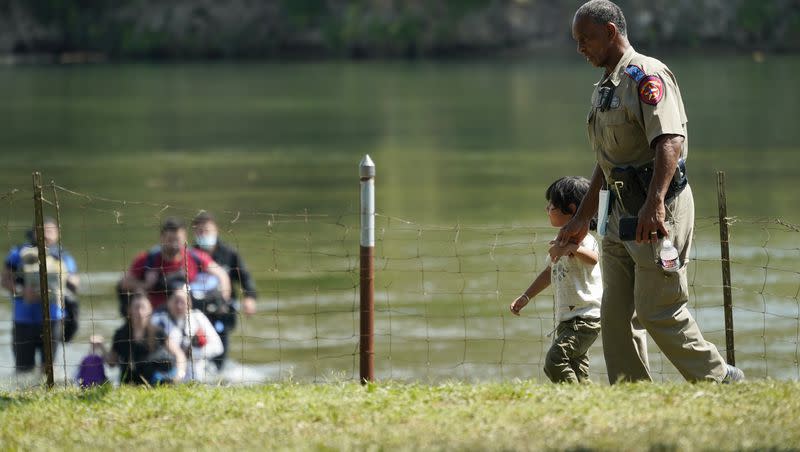Texas bill allowing officers to arrest migrants crossing the border illegally, including in churches and schools, awaits gov’s signature

- Oops!Something went wrong.Please try again later.
In response to the number of illegal border crossings into Texas more than tripling since 2020, Gov. Greg Abbott plans on signing Senate Bill 4 which allows state law enforcement officers to arrest migrants who enter the country illegally and would require judges to return the migrants to the countries they entered from.
This bill is part of a larger compilation of immigration bills the governor plans on signing into law. On Nov. 21, Abbott signed a bill which included increasing penalties for human smugglers that will go into effect on Feb. 6, 2024, per KUT News.
In the 2020 fiscal year, 300,000 people crossed the Texas border illegally, and in the 2022 fiscal year, the number reached over 1 million people, per Texas’ State Affairs committee report.
In March 2021, Texas deployed the Texas National Guard and the Department of Public Safety to the border under the name, “Operation Lone Star.” This new bill requires illegal migrants to return to the country they entered from and provides protection for government officials, employees and contractors connected to this law enforcement.
The bill makes illegal entry a criminal offense
SB4 amends Texas’ criminal code and creates illegal entry across the border a Class B misdemeanor offense.
The bill increases punishment for migrants who reenter Texas illegally after having been forcibly removed at least once previously. Punishment increases apply to individuals who fall under the following categories, per the Texas State Affairs committee report:
If the person’s removal was because of two or more misdemeanors “involving drugs, crimes against a person, or both.”
If the person “was excludable on the basis of terrorist activities.”
If the person was previously removed by federal law regarding alien terrorist removal procedures.”
If the person was moved out of prison before their sentence was finished.
The bill also allows law enforcement officers to arrest migrants in the country illegally in places where it was previously prohibited, including public and private schools, churches, synagogues and other religious spaces, health care facilities and SAFEready facilities.
If arrested, a state judge will order the person to return to the country they left, and if they refuse they can face up to 20 years of jail time.
Most illegal immigrants entering Texas aren’t Mexican
In 2023, over two-thirds (83%) of immigrants crossing the border from Mexico into Texas weren’t Mexican citizens, per the Texas Tribune. A larger percentage of migrants came from Central and South America, Asia and Eastern European countries.
Since Jan. 1, 2023, 42,100 pounds of marijuana, 27,200 pounds of methamphetamine, 11,600 pounds of cocaine and 547 pounds of fentanyl were seized by agents in Del Rio, El Paso, Laredo and Rio. Grande, Texas, U.S. Customs and Border Protection reported.
Heated debate over the bill’s potentially negative implications
Texas state Sens. Brian Birdwell and Charles Perry debated whether the legislation is constitutional during a Senate vote in early November, with Birdwell claiming it challenges the CBP’s federal jurisdiction of migrant control, per ABC.
Birdwell, a Republican, had introduced a similar bill last session, said his version made sure not to challenge the federal government’s authority.
“That is why all my attempts to carry this legislation and the bill language therein had the proper federal authority responsible for disposition and deportation of those that we detain,” he said.
Perry, also a Republican, said, “While I agree we are testing and pushing envelopes, the state has every right to protect its citizens, and this nation has every right to expect Texas to do that when called to do it.”
Executive director of the nonprofit group Somos Tejas, Ramiro Luna, said the bill “legalizes racial profiling,” as it authorizes Texas officers to investigate and potentially arrest people they believe crossed into the state illegally, according to NBC Dallas Fort Worth.
“Communities of color are the ones that are being jeopardized the most, and it’s something that’s really going to harm the state as a whole,” Luna said.
Before the Senate vote in November, Texas Rep. Jolanda Jones, a Democrat, described SB4 as “racist.” She said, “It’s not all right to be racist. I will stop pulling the race card when you stop being racist,” per The Guardian.
When will SB4 go into effect?
The bill passed the Senate on Nov. 21, passed the House on Nov. 27 and sent to Abbott on Nov. 27, per Texas Legislature. There is not a clear timeline for when the governor will sign the bill.

